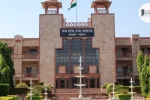Supreme Court Clarifies Applicability of Transfer of Property Act Over West Bengal Tenancy Act in Landmark Landlord-Tenant Dispute

In a significant ruling, the Supreme Court of India has mandated that tenants continuing to occupy premises post-lease expiry are liable to pay occupational charges based on prevailing market rates. This judgment arose from a dispute between Bijay Kumar Manish Kumar HUF (the petitioner) and Ashwin Bhanulal Desai (the respondent), heard by Justices J.K. Maheshwari and Sanjay Karol.
Background
The dispute centered on whether the West Bengal Premises Tenancy Act, 1997, or the Transfer of Property Act, 1882, should apply to a landlord-tenant disagreement involving the recovery of possession, eviction, and rent payment. Initially, the City Civil Court at Calcutta ruled in favor of the petitioner, asserting that the Transfer of Property Act governed the case due to the lease’s inception in 1992, before the Tenancy Act’s enforcement in 2001. However, the High Court later ruled in favor of the respondent, leading to the dismissal of the eviction suits.
During the pendency of the Special Leave Petitions (SLPs), the Supreme Court directed the respondent to deposit occupational charges based on market rates, amounting to INR 5,15,05,512/-.
Key Points of the Judgment
Jurisdiction and Applicability: The Supreme Court upheld the trial court’s determination that the dispute fell under the Transfer of Property Act, given the lease’s establishment date.
Occupational Charges: The Court emphasized that tenants continuing to occupy premises after lease expiry are akin to tenants at sufferance and must compensate the landlord at market rent rates.
Legal Precedents: The ruling referenced several landmark cases, including Atma Ram Properties (P) Ltd. v. Federal Motors (P) Ltd. and State of Maharashtra & Anr. v. Super Max International Private Limited & Ors., affirming the principle that tenants owe mesne profits or market rent during eviction proceedings.
Deposit Order: The Court ordered the respondent to deposit the substantial amount of INR 5,15,05,512/- with the Court Registry, ensuring the amount is placed in an interest-bearing fixed deposit pending the SLPs’ final adjudication.
Court Observations and Analysis
The Supreme Court meticulously analyzed the principles of lease determination, tenant at sufferance, and the obligation to pay mesne profits. The judgment highlighted that the landlord’s right to equitable compensation must be preserved, especially when deprived of rent due to prolonged litigation. The Court underscored that continuing possession post-lease expiry without payment of market rent is unjust and imposes financial strain on landlords.
Conclusion This ruling reaffirms the judiciary’s commitment to ensuring equitable justice in landlord-tenant disputes, particularly emphasizing landlords’ rights to fair compensation. The judgment sets a precedent for similar cases, stressing the importance of timely rent payments and fair compensation equivalent to market rates during litigation.
Date of Decision: May 17, 2024
Bijay Kumar Manish Kumar HUF vs. Ashwin Bhanulal Desai






